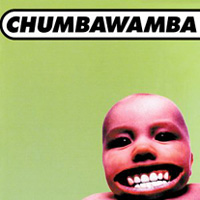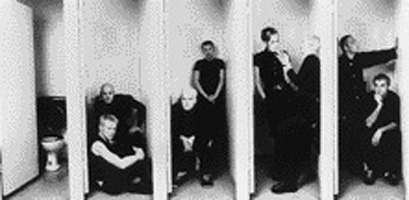 Chumbawamba
Chumbawamba
Tubthumper (Universal)
An interview with Boff
by Scott Hefflon
Despite the backlash “Tubthumping” is experiencing, Tubthumper is a great album. Chumbawamba has been a college radio fave for years, but commercial radio is only now picking up on them. It took an edited version of “Tubthumping,” without the spoken intro of “I thought the music mattered. But does it? Bollocks!” to get radio stations to play the living shit out of the criminally-catchy pop tune. While the anthemic chorus of “I get knocked down, But I get up again, You’re never gonna keep me down” repeats and repeats and repeats, it’s only after further investigation that you appreciate the irony. To call Chumbawamba a smorgasbord of pop culture/pop music tidbits is to miss the irreverence, the humor, the “statement,” the juxtaposition of tearing down the man-made walls within society yet crafting the perfect pop formula. Renegade scientists they are, cross-breeding rebellion with slick ’80s synthpop (think Pet Shop Boys, Pop Will Eat Itself, and B-52s), dance music of the early and mid ’90s, not to mention an unhealthy dose of horns, huge co-ed choruses, and dramatic guitars. Tampering with the balance of the nature of pop, Chumbawamba are dangerous, truly dangerous.
I understand you’re in the middle of a photo shoot. Who’s it for?
A few magazines, apparently, one of which is Hits or something. We haven’t started yet, but we’ve pulled out a bunch of our clothes and now we’re standing here. We have no idea what we’re going to do, but we know what we don’t do. If they ask us to hold teddy bears, we’ll have to say no.
So you aren’t the posterboys, ahem, posterpeople for the Next Generation?
You’d have a job making us posterchildren.
You’ve always had great album titles: the post-Live-Aid Pictures of Starving Children Sell Records, the punky Never Mind the Ballots, the accapella folk album English Rebel Songs, the early ’90s dance of Slap!, the unreleased Jesus H. Christ, the anti-censorship Shhh, and then the all-over-the-board Anarchy, Swinging with Raymond, and Tubthumper. What is a tubthumper?
Someone who stands on a soapbox on the street corner and shouts what’s wrong with the world.
You seem to have a theme going with the baby on the cover. What’s the story behind that?
The anarchy baby was just being born on Anarchy, and we thought it should be eight months to a year old with a bit of attitude on Tubthumper.
You probably get asked this all the time, but what the hell does “chumbawamba” mean?
When we first started off, we used to go busking in Paris during the summers. We would play music in the streets to earn money during the summer months. We did that for a few years. Every time we were there, there was a huge African drum band, 12 or 13 people banging drums. It’d drown us out and we’d have to go somewhere else. They were brilliant, actually, so we had this kind of love/hate relationship with them. They use to chant “Chumbawamba.” We still have no idea what it means.
 You could’ve just named your band “Shop at Wal Mart®,” “Flowers are pretty,” or “My dad’s feet sure do stink.”
You could’ve just named your band “Shop at Wal Mart®,” “Flowers are pretty,” or “My dad’s feet sure do stink.”
Knowing us, it means something ridiculous or obscene. We usually make up some story explaining what the name means, but for you today, this is the story.
From the beginning, a little over ten years ago, you’ve had the same members in the band. And a lot of them. Why are there so many people in the band?
That’s just the way it was. We got together as a group of people who thought it would be good to play music together, even though we couldn’t play instruments at the time. It didn’t stop at four. We didn’t think, “OK, now we have four – we’re a band.” We always knew someone else, and we’d bring them in to play something. It was a bunch of people that got on together as friends, a gang.
Did you all go to school together, are you from the same neighborhood?
We were all within about 50 miles of each other in the north of England, and everyone just ended up in Leeds, got to know each other, and, as they say, fate played the straight man.
Was “Tubthumping” your first video, or have you done some on your own?
We’ve done other videos, but they’re not the same sort of thing. We started making videos about five years ago with, like, £200 of our own money. Obviously they were awful, but they got a little bit better every time. This is the first time we’ve had one that’s been properly distributed.
As a band with a message, what ideas were you trying to get across in the “Tubthumper” video?
The only thing we really wanted to get across was feeling positive and having a good time. A lot of people wouldn’t call that political, but I would. One of the reasons behind that was, as anyone who knows us and knows our context knows, we were a “college radio band” with a small fanbase selling maybe 30,000 records if we were lucky. Everyone who knows our history sees us as a very somber, political band with lots of inadvertent comments and “important” things to say, so we wanted to make a record that was really positive. When we came to make the video, we asked a lot of friends to come down, drink as much as they want and have a good time.
That’s the video, not the song necessarily. I mean, you have a bridge of “pissing the night away” sung in a sugar-sweet female voice…
We’ve always liked playing with words. Over here (England, natch), “piss” doesn’t have the same power to it. It’s a real issue that a lot of stations played the song with that word in it. We like the idea of having such a sweet-sounding melody with the word piss in it. The phrase “pissing the night away” refers mostly to drinking a lot. When you say you’re getting pissed, it doesn’t mean you’re getting angry, it means you’re getting drunker and drunker. It means you’ve got to go to the toilet all the time. We wanted a lot more of the video to involve toilets, but we were assured that would be a deathwish for the video.
I don’t know,Trainspotting seems to’ve legitimized, or at least popularized, the use of the toilet as a significant image.
If that beautiful scene in the movie had been in a video, I doubt you’d have seen it on MTV.
What other images or references do you consider important?
On Tubthumper, we consciously wrote a lot about the north of England, the streets where we live, if you will. We also made a decision that all the loops, samples, and quotes from radio and television speeches would be from the north of England. The films on there, Brassed Off and Raining Stones, are by Mike Leigh and Ken Loach, very working class film directors from Britain. They’ve been making fantastic films for years. Mike Leigh just won an Oscar for his last film. Some of the people got Oscars for Secrets & Lies. We felt like the film directors who were used to working with ordinary people, making films about real life, were getting recognized. That’s what we wanted to do. While retaining the integrity, be able to make popularist ideas. There’s a film called Withnail and I that’s a big influence on us.
Are you a big film buff?
Sort of. I’m not particularly, but Danbert (Nobacon, vocals/keyboards) and Paul (Greco, bass) are. They can quote you whole pieces from obscure films.
You started in the ’80s, and you preserve the best elements of ’80s synthpop, but you supplement it with jungle and drum’n’bass, always keeping your tongue firmly planted in cheek. Is it from having so many people in the band, or is each person really that diverse?
It’s definitely due in part to there being quite a lot of us, and we accommodate what each one brings to the band’s sound. With Jude (Abbott, trumpet/vocals) joining the band, it was inevitable that somewhere on the album there’d be some sort of brass band section. She can play it well and she’s into it, so it fits with what we do. If we all went off and did solo albums, they’d be eight very different solo albums. I love that. Also, we incorporate styles as they happen, like drum’n’bass. We don’t do it cynically because we think we ought to, we do it because we love it. Whatever we’re listening to at the time, we want to include some of it on the album. Honestly, I think it’s strange more bands don’t do that. When you listen to most bands, you get an idea of roughly what they’re about and where they’re heading. But then it becomes very hard for that band to surprise you. And everyone’s responsible for keeping bands that way. We all think that because we’re buying their records, the band can’t come back a year and a half, two years later, with something completely different. We want what we want from them. If you like an author or a filmmaker, you don’t want them to make something completely different if you liked the first thing. But then there have to be people doing something completely different, even if no one likes it.
One of your songs, “The Good Ship Lifestyle,” which I love partly because it strikes so close to our “Good Ship Lollipop” sentiment, has the lyric “All my friends jumped ship.” I think you really tax the majority of your fans by changing so drastically, sometimes 180°, from one album to the next.
We don’t make music just for ourselves. We could be really smug and say, “We’re going to do an a capella folk album and none of you’ll like it, so get lost.” But we think of it more as respecting the audience’s intelligence and flexibility, saying, “You’ve liked the stuff we’ve done before, but here’s what we’re doing now and we’d like you come with us on this.” We aren’t throwing it in people’s faces and saying, “Ha! It’s different.”
How many songs do you write vs. finish and record vs. how many actually make it onto any given album?
This time, it was about 2-to-1. We more or less finished about 20 songs, and 10 or 11 made it onto the album (12, actually). A lot of the small bits in between, the talking clips and such, are actually extracts from songs, full songs with choruses, lyrics, and everything, that never quite made it. We chopped them down and used bits of them in various places because we thought it’d be nice to stick everything together like that.
They Might Be Giants has a song called “Fingertips,” a long string of snippets from what could’ve been over an album’s-worth of songs. Any one of the tidbits, if taken the distance, could’ve been a great song. It’s mind-boggling to think a band can be so prolific they can fire off idea after genius idea as if the creative well will never run dry.
Was it frustrating? Did you wish they’d given you more on some of the pieces?
I took it the other way: writing the rest of the song was unnecessary. It only would’ve added filler to a quick, concise, marvelous idea. Each bit leaves the listener to write the rest of the song themselves. I found it truly inspirational. That’s why I ask you, as a band that can play so many styles, do you find it inhibiting to only release 12 or 13 songs a year?
Not really. It encourages us to do projects, offshoots, under different names. It would be nice to do that sort of thing on a bit more of a regular basis. Usually we do offshoots when we’re reacting to something, when we think the time is right to put out an album or a single that’s this kind of music, or about that topic. Basically, an outlet where we could take a small bit from the album and expand on it, explore it, see where it goes.
So you’ve put out a few side projects over the years?
Yeah, we’ve done it probably about four or five times. We’ve done some joke ones, like the “All You Skinheads” thing we did for about a week that ended up on compilations and singles. We also formed a band that supported a political party in Britain. It was a tongue-in-cheek way of saying how stupid they were, and the party loved it so much they wrote to us, asking us to work with them. At another point, a ferry went down off the coast of Britain, and all the stars, Paul McCartney and everyone, got together and did a version of “Let it Be.” We did our own version of “Let it Be” that came out about two weeks after theirs did, and it caused quite a bit of a stir. It’s actually quite easy to do those things once you know your way around a recording studio.
You’ve used the word, or at least the idea of, reaction a number of times. How creative do you think reaction is? While, admittedly, all things must be “inspired” by something which already exists, isn’t reaction a rather low-level reflex? Stimulus-response, if you will?
Yeah, you’re right, the process can be really negative, not to mention derivative, if you’re not careful. There’s a famous quote by an anarchist named Deroutsy who said that in order to build something, you have destroy the old thing first, then rebuild from the ruins. It’s no good thinking you’re going to build something fantastic and brilliant that’s separate from the old thing, because then it’s merely an alternative. You have to demolish what’s there, then use it to build something new.
Are there other side projects you’ve done?
We read about a band, an American band I think, who put 100 songs on a CD. So we decided to do an album with 101 songs. We wrote all the songs about sports, called the band Sportcaster, and called the double album 101 Songs about Sports. In order to fit them all on there, each song was only about a minute long. Or less. We really enjoyed doing it, even though it only sold 5,000 copies or so, and people are still coming up to us saying they’d wished we’d taken some of the songs and turned them into full three minute songs. But that would’ve defeated the point completely.
In such cases, I always think of the Emperor’s comment about “too many notes” in Amadeus. Sometimes there can be neither no more nor no fewer notes without destroying the piece.
Exactly. Then again, I really like the Beatles anthology albums. I actually like some of the songs on them better than the originals, or at least the well-known versions. You get all this other stuff going on in there, all sorts of interesting things which are really part of the whole, but you never get to hear them in the cleaned up, “finished” version.
You need to put out a Chumbawamba box set.
It would have to be a very big box.



